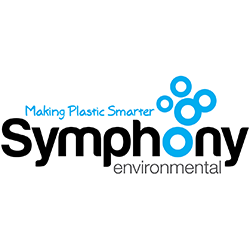Symphony Environmental Group plc (LON:SYM) Chief Financial Officer Ian Bristow caught up with DirectorsTalk for an exclusive interview to discuss receiving FDA approval for its d2p technology & what this means for the company, other regions being targeted and what investors can expect over the coming months.
Q1: As pointed out, you’ve received approval from the US Food and Drug Administration, what does this mean for Symphony Environmental? What does it enable you to do?
A1: What does it mean for the group? Well, it has many, many levels, really one it’s a vindication of our general d2p Designed to Protect range as a whole. We have developed a number of technologies over the last five or six years, which we announced yesterday, over a hundred projects, globally at this moment in time.
This one in particular is very, very exciting because, as you said, it’s approved by the FDA using their FCN procedure and in particular, it allows us, with this FCN to work with and developed with customers and end-users in developing their film, such they have antibacterial technology, on the packaging film.
This is important for the bread industry because bread is obviously quite moist and with moisture within the environment that the bread is packed, it can create opportunities for microbes and microorganisms’ bacteria to grow. By applying protections into the film itself, and using our clever innovative way of doing it within the various layers in the film, it enables the film itself to protect the environment by making sure that any microbes that land on the film don’t survive too long effectively. So that’s obviously a major important aspect for bread companies.
So, that makes allows us to enhance FDA approval to really accelerate the trials that we’ve been doing, it gives greater efficacy and a greater flexibility in terms of the materials that are used by the end users, by the bread companies, and also allows us to really work with them to much greater extent to create the packaging that’s ideal for their needs. It depends on the bread company, it depends where their bread is manufactured and the types of bread, as you probably know there’s many different types of breads out there, all with different characteristics. So, it just gives us an overall opportunity for the whole of the bread market in the USA.
Q2: Can you tell us about the opportunity or market value that you targeting there in the US?
A2: In terms of the US opportunity, the actual market value of bread itself, packaged bread that is, different types of bread, unpackaged bread and packaged bread, but packaged bread itself is worth more than $20 billion, that was in a report that we did in 2018 and that’s growing an incremental rate each year.
So, this is really not about us putting in and defining a certain percentage and volume that can go into that, really this is a technology cell so really, it’s a question of what it’s worth to the bread manufacturers, to themselves in terms of what protection they want for their packaging around their bread. So, really, it’s something within a $20 billion, obviously we’re not talking billions as such but there’s a large value there where we can monetize our solution.
Really, it should increase obviously the value for the bread manufacturers as well, because it gives them, if they like, a differentiation for their product and it helps with their USP’s and the way they sell the bread as well. So, hopefully whatever value is in that $20 billion is a value that is also multiplied many times from the bread companies themselves.
What’s also important is other countries follow US approvals, especially FDA-type approvals so we’ve been doing trials in other parts of the Americas, Latin America, many, many countries there and other parts of the world also that look to follow the FDA. If one’s got an FDA approval, they will probably automatically include that type of approval in their own food and drug scheme as such.
So, we’ve got a number of trials globally on that as well so it’s not just the USA, it’s many, many markets that this allows us to get into.
Q3: Finally, what else can investors look out for over the coming months from Symphony Environmental?
A3: Well, our trading update yesterday, which is to the H1 period end, again, we announced with d2p Designed to Protect, which includes this technology for many, many products including food and bread, as we just mentioned, pipes and tanks, PPE gloves, cables, car components. There’s a number of projects there that we feel we can see are going to come to a conclusion over the coming months.
So, what we hope to announce during Q3/Q4 is actually some commercial progression now in a number of these areas, in a number of applications. That’s really what we feel we can deliver during this year and get the commercial traction moving upwards during this year and we’ve anticipated substantial revenues into next year.

